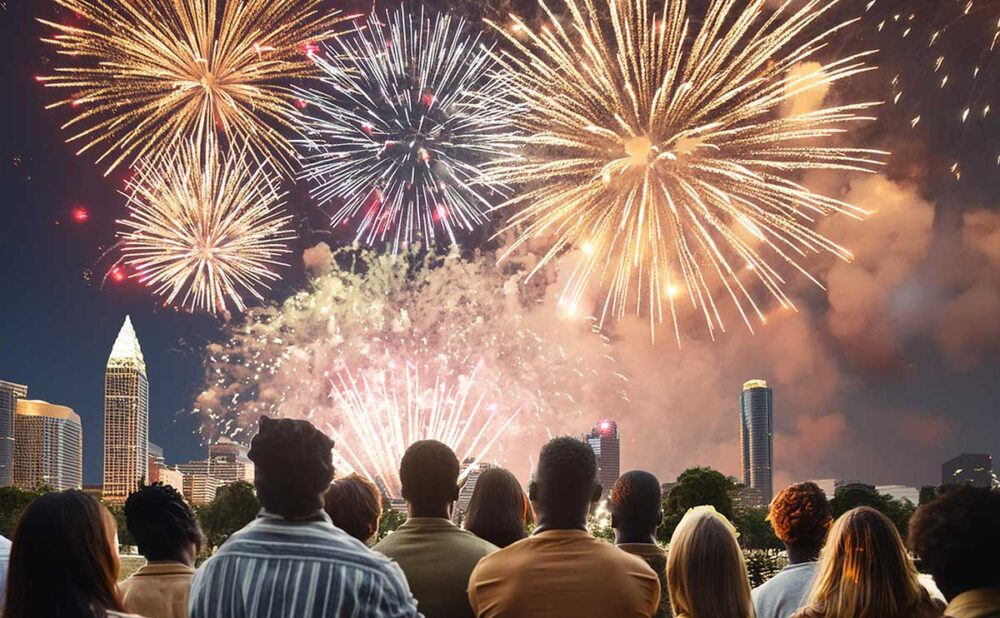Fireworks Safety: Protecting Yourself and Others
As communities across the nation gear up for summer celebrations, the allure of fireworks fills the air with excitement and anticipation. However, amidst the dazzling displays and booming explosions lies a potential for danger that cannot be ignored. Understanding the risks and responsibilities associated with fireworks is crucial in ensuring a safe and enjoyable experience for all.
Fireworks are a staple of celebrations and special occasions, but it’s crucial to prioritize fireworks safety to prevent potential injuries. Negligence when handling fireworks can lead to severe consequences, both physically and legally.
In the event of a fireworks-related injury, seeking legal guidance from a personal injury lawyer can help determine liability and explore options for financial recovery. Prioritizing safety and responsible firework handling is key to enjoying these dazzling displays while minimizing the risk of accidents and injuries. Stay informed, stay safe, and make every celebration a memorable and secure one.
A Comprehensive Guide to Fireworks Accident Injuries and Liability
Fireworks have long been a staple of American festivities, symbolizing patriotism and revelry. From grand public displays to intimate backyard gatherings, the allure of fireworks transcends age and background. Yet, the whimsical charm of fireworks belies their inherent hazards, prompting a closer examination of the liabilities involved in case of injuries.
The debate surrounding amateur fireworks is multifaceted, with concerns ranging from noise pollution to safety hazards. While fireworks undoubtedly add a spark of excitement to any event, their unpredictable nature poses a significant risk to both spectators and operators. As the echoes of fireworks reverberate through the summer nights, the need for caution and responsibility becomes ever more apparent.
If you do sustain an injury from fireworks, who’s liable for your injury? We will examine the different scenarios in which a fireworks-related injury can occur and determine who could potentially be held accountable for the damages.
Liability for a Public Fireworks Display
When it comes to public fireworks displays, the onus of safety falls on professional operators who are tasked with orchestrating awe-inspiring shows. Despite their expertise, accidents can still occur, as evidenced by past incidents where malfunctions led to injuries. The statistics paint a sobering picture, with nearly 3% of fireworks injuries occurring at public shows annually, according to the American Pyrotechnics Association. While the vast majority of displays proceed without incident, the possibility of mishaps underscores the importance of vigilance and preparedness. In the event of an injury at a public fireworks display, determining liability hinges on a myriad of factors, including the cause of the accident and adherence to safety protocols.
Navigating the complex landscape of fireworks liability requires a nuanced understanding of the legal implications involved. Whether you are a spectator enthralled by the spectacle or a host organizing a private display, being aware of the risks and responsibilities associated with fireworks is paramount. By prioritizing safety and exercising caution, we can ensure that the magic of fireworks is enjoyed responsibly and without harm.
Unraveling Liability in Fireworks Mishaps
Fireworks displays, with their dazzling lights and explosive sounds, never fail to captivate audiences. However, when fireworks go awry, the repercussions can be severe, leading to injsuries and property damage. In such unfortunate instances, understanding liability becomes crucial in determining who is accountable for the mishap.
The Risks and Responsibilities of Fireworks
The primary party that often bears the brunt of liability in fireworks accidents is the pyrotechnics company. This responsibility stems from various factors, including lighting fireworks too close to spectators, neglecting wind conditions, and improper maintenance of launching apparatus.
Additionally, the entity that contracted the pyrotechnics company can also be held accountable for negligence in location selection, inadequate crowd control, and failure to ensure public safety measures.
Furthermore, manufacturers of fireworks can be liable if the mishap is attributed to manufacturing defects, lack of adequate warnings, or inherent dangers due to poor design. In cases involving injuries from private fireworks, determining liability becomes more complex, especially considering the prevalence of consumer fireworks at social gatherings.
Liability for an Injury from Private Fireworks
In scenarios where individuals host fireworks displays, ensuring guests’ safety is paramount to mitigating liability risks. Implementing safety precautions, maintaining safe distances, supervising children, and removing flammable materials can significantly reduce the likelihood of accidents and subsequent liability.
In the event of an injury caused by private fireworks, the responsibility for the incident hinges on multiple factors. Courts often consider the negligence of the injured party alongside the actions of other involved individuals. Factors such as awareness of firework dangers, adherence to safety practices, and compliance with handling instructions play a pivotal role in determining liability.
Moreover, if a product defect is identified as the root cause of the accident, a product liability lawsuit may be pursued. This legal avenue enables individuals to seek damages for manufacturing defects, design flaws, or inadequate safety instructions. However, pursuing legal action against overseas manufacturers can pose challenges, making retailers a potential alternative target for claims.
Navigating the web of liability in fireworks accidents demands a nuanced understanding of responsibilities and legal implications. By upholding safety standards, adhering to guidelines, and exercising caution, all parties involved can contribute to a safer and more enjoyable fireworks experience for everyone.
Unveiling the Risks and Realities of Fireworks Incidents
Fireworks have long captivated audiences with their dazzling displays of light and sound, but behind the magic lies a potential for danger. Understanding the spectrum of fireworks accidents is crucial in promoting safety during celebrations.
What Are Fireworks Accidents?
Firework accidents encompass a range of incidents involving the use of fireworks or pyrotechnics. The legal definition of fireworks may vary across states, but generally, these explosive devices are designed to produce visual or auditory effects through combustion, deflagration, or detonation. There are three main categories of fireworks:
Consumer Fireworks
Tailored for personal use, consumer fireworks are relatively milder in explosive force. Sparklers, fountains, smoke balls, and roman candles fall under this category.
Display Fireworks
Crafted for professional showcases, display fireworks pack a more potent punch with larger explosive effects. Aerial shell devices and grand firecrackers are examples of these high-impact fireworks.
Novelty Fireworks
Found in local stores during festive seasons, novelty fireworks offer minimal explosive power and noise. Wire sparklers, snappers, and paper lanterns are popular choices in this category.
Fireworks Safety: Understanding the Risks and Preventing Injuries
Fireworks are a staple of many celebrations but can pose serious risks if not handled properly. Injuries from fireworks accidents can range from minor burns to life-altering consequences. According to the Consumer Product Safety Commission (CPSC), head and finger injuries make up approximately 29% of all emergency department-treated fireworks injuries.
Common Fireworks Accidents
Fireworks accidents often occur when these pyrotechnics deviate from their intended behavior, leading to injuries. Some prevalent mishaps involve premature explosions, misfires, or improper handling. These incidents can result in burns, disfigurement, or unintended fires, posing risks to users and onlookers alike. Let’s explore the common types of injuries associated with fireworks accidents and how to prevent them:
- Burns. The most prevalent type of injury resulting from fireworks accidents is burns. These burns can vary from minor redness to severe skin damage, including white, leathery skin.
- Hand and Finger Injuries. Mishandling fireworks can lead to hand and finger injuries, accounting for about 29% of emergency room visits for fireworks-related injuries.
- Head, Face, and Ear Injuries. The head, face, and ears are vulnerable to fireworks explosions, with approximately 19% of injuries occurring in these areas.
- Leg Injuries. Cuts, bruises, and trauma to the legs are common in firework accidents, representing around 19% of fireworks-related injuries.
- Eye Injuries. Protecting your eyes is crucial when handling fireworks, as approximately 19% of injuries involve eye damage.
Fireworks Safety Tips
While these injuries are common, more severe consequences like limb loss, sight loss, hearing loss, and even fatalities can occur in extreme cases. It’s essential to prioritize safety when using fireworks to prevent these tragic outcomes. Keep in mind that even legal fireworks can result in injuries. Celebrate safely and take into account the following guidelines while organizing your Independence Day fireworks celebration:
- Attend public firework displays organized by professionals.
- Keep a safe distance from fireworks when they are being lit.
- Never attempt to relight a malfunctioning firework.
- Wear protective gear, such as safety glasses and gloves, when handling fireworks.
- Keep a bucket of water or a fire extinguisher nearby for emergencies.
By shedding light on the nuances of fireworks accidents and their potential repercussions, individuals can approach fireworks displays with caution and mindfulness, ensuring that celebrations remain joyous and safe for all.

GEORGIA PERSONAL INJURY LAWYER NEAR ME
Should I Hire a Lawyer for Assistance with a Fireworks Accident Claim?
Understanding your legal options in the aftermath of a fireworks-related injury is crucial for seeking appropriate compensation and holding accountable those responsible for your harm. Whether negotiating a settlement or representing you in court, legal expertise can significantly impact the outcome of your case. Protect your rights and seek the guidance of a legal professional to navigate the complexities of fireworks injury claims effectively.
If you or a family member has been injured in a fireworks accident due to the negligence of another, the experienced attorneys at The Jewkes Firm can help. Contact us now at (770) 771-5130 or fill out the form for a FREE consultation.
By understanding the risks associated with fireworks and taking necessary precautions, we can enjoy these dazzling displays while prioritizing safety for ourselves and those around us. Let’s celebrate responsibly and prevent fireworks injuries for a brighter and safer future.




